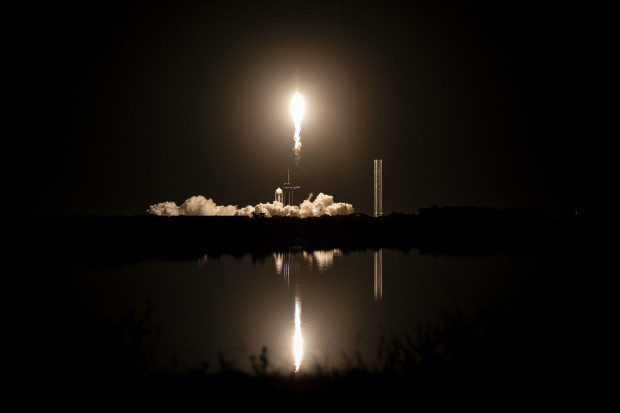
SpaceX has been on a tear recently, launching dozens of its rockets throughout the year in a bid to outpace its 2022 launch frequency. The bulk of these launches -- utilizing the company's reusable Falcon 9 rocket -- have carried out the crewless missions of deploying more of the company's Starlink satellites in low Earth orbit.
There are currently more than 4,500 of these satellites in orbit around the planet, though SpaceX intends on deploying as many as ten times that amount.
DON'T MISS: Investor Says $150 Billion SpaceX Valuation Seems Too Good to Be True
But SpaceX conducted a different kind of launch Aug. 26, sending an international crew of NASA astronauts to the International Space Station. This latest launch represents the company's 11th crewed mission, including three recent private astronaut flights.
The four-person team, Crew-7, docked with the ISS on the morning of August 27, concluding a nearly 30-hour journey that began on NASA's Pad 39A at the Kennedy Space Center in Florida the day before.
The @SpaceX Dragon Endurance spacecraft docked to the station’s Harmony module at 9:16am ET today. The four #Crew7 members are now prepping for hatch opening. https://t.co/XR8weAFc9k pic.twitter.com/qh3ItKAHqc
— International Space Station (@Space_Station) August 27, 2023
The four astronauts are set to spend the next six months aboard the space station, which will be housing 11 astronauts until Sept. 2, when Crew-6's four-person team is set to return to Earth.
More SpaceX:
- Environmental Groups Make Serious Move After Damaging SpaceX Explosion
- Elon Musk Says He Has the Answer About Aliens
- Watch: Elon Musk's SpaceX Sets a Giant New Record
Dragon on its way to the @space_station pic.twitter.com/NE6sCsH7aD
— SpaceX (@SpaceX) August 27, 2023
"This is the first step of the journey, the real mission begins now," Crew-7 pilot Andreas Mogensen of the European Space Agency radioed SpaceX. "Aboard the International Space Station, we have a lot of work ahead of us that we look forward to."
SpaceX chief Elon Musk chimed in briefly on the successful launch, reposting a video of the docking and adding a unique piece of insight.
"Dragon docks with space station," he said. "Strange to think that they’re both traveling at ~25 times speed of sound!"
As SpaceX continues to increase its number of annual launches in an effort to make space travel ubiquitous on Musk's journey to Mars, the risks the growing industry poses to the environment are great. A 2022 study that focused on the impact of fossil-fuel-burning rockets such as SpaceX's Falcon 9 found that rockets currently inject about 1,000 tons of soot annually into the upper levels of Earth's atmosphere, which can warm those layers.
The study found that an increase in rocket launches could increase the temperature of those upper layers, something that could weaken the protection of the ozone layer, which helps prevent the sun's harmful rays from reaching the surface.
Get investment guidance from trusted portfolio managers without the management fees. Sign up for Action Alerts PLUS now.







